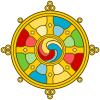Shechen Monastery
| Shechen Monastery | |
|---|---|
Tibetan transcription(s) Tibetan: ཞེ་ཆེན་བསྟན་གཉིས་དར་རྒྱས་གླིང་། Wylie transliteration: Zhe-chen bsTan-gnyis-dar-rgyas-gling | |
| Religion | |
| Affiliation | Tibetan Buddhism |
| Sect | Nyingma |
| Location | |
| Location | Langduo Township, Dege County, Sichuan, China, known as Kham |
| Country | China |
| Geographic coordinates | 32°15′58″N 98°53′10″E / 32.26611°N 98.88611°E |
| Architecture | |
| Founder | Shechen Rabjam Tenpé Gyaltsen |
| Date established | 1695 |
| Part of a series on |
| Tibetan Buddhism |
|---|
 |
Shechen Monastery (Tibetan: ཞེ་ཆེན་བསྟན་གཉིས་དར་རྒྱས་གླིང, Wylie: zhe chen bstan gnyis dar rgyas gling) is one of the "Six Mother Monasteries" of the Nyingma tradition of Tibetan Buddhism. It was originally located in Kham, Tibet, but was destroyed in the late 1950s during the Cultural Revolution and was rebuilt in Nepal in 1985.
History
[edit]The original Shechen Monastery was located southwest of Langduo Township in Kham on the route to Dzogchen Monastery in what is now Dêgê County, Garzê Prefecture, Sichuan, China.[1] It was founded in 1695 by Shechen Rabjam Tenpé Gyaltsen, though it is sometimes claimed to have been built by Gyurme Kunzang Namgyal in 1734. It became extremely influential in the 18th and 19th centuries, with up to 160 satellite monasteries dotting the hillsides. The monastery was destroyed in the 1950s as part of the Communist Chinese government's Cultural Revolution.
In the 1980s, Dilgo Khyentse Rinpoche transplanted the rich tradition of the original Shechen Monastery to a new home near the great Stupa of Boudhanath in Kathmandu, Nepal.[2][3][4]
Shechen Monastery today
[edit]The monastery serves as the main seat of the Shechen tradition in exile. There are more than 300 monks at Shechen Monastery. The monastery teaches music, dance, painting and Buddhist philosophy. Its elementary school provides "a modern education for children between five and fourteen years of age."[5]
The present abbot is the seventh Shechen Rabjam Rinpoche, the grandson of Dilgo Khyentse. Prominent members of the monastery include the Yangsi (Tib.ཡང་སྲིད reincarnation) of Dilgo Khyentse, Khandro Lhamo, Matthieu Ricard and Changling Rinpoche.
Footnotes
[edit]- ^ Dudjom Rinpoche and Jikdrel Yeshe Dorje (1991), Vol. II, page 485.
- ^ "Shechen Tennyi Dargyeling Monastery, Baudanath, Nepal ::id="fb-yt" shechen.org".
- ^ "Shechen Monastery | Lotus Speech Canada".
- ^ "Celebrating the 100th anniversary of Dilgo Khyentse". Bhutan Majestic Travel. 13 May 2010. Archived from the original on 7 July 2011. Retrieved 16 August 2010.
- ^ "Shechen Monastery, Kathmandu". Nepal Channel. Retrieved 30 October 2013.
References
[edit]- Dudjom Rinpoche and Jikdrel Yeshe Dorje. The Nyingma School of Tibetan Buddhism: its Fundamentals and History. Two Volumes. 1991. Translated and edited by Gyurme Dorje with Matthew Kapstein. Wisdom Publications, Boston. ISBN 0-86171-087-8
External links
[edit]- Shechen Monastery in Nepal - the main Shechen website
- Shechen Monastery in Tibet
- Shechen Rabjam Rinpoche's profile at Rigpa wiki
- Buddhist temples in Tibet
- Buddhist temples in Nepal
- 1695 establishments in Asia
- Religious organizations established in 1695
- Buddhist monasteries in Tibet
- Tibetan Buddhist temples in the Garzê Tibetan Autonomous Prefecture
- Nyingma monasteries and temples
- 1985 establishments in Nepal
- Buddhist monasteries in Sichuan
- Tibet stubs
- People's Republic of China religious building and structure stubs
- Buddhist monastery stubs
